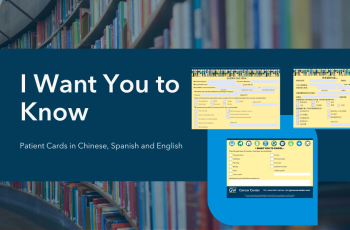This work was supported by Cooperative Agreement #NU58DP007539-01 from the Centers for Disease Control and Prevention (CDC).
Health Equity
This website from the National Cancer Institute contains maps of cancer incidence and mortality that reveal the areas across the rural-urban continuum where the incidence and death rates from cancer are elevated.
This “I Want You to Know” printable card can help patients begin a conversation with their provider about their identity and care preferences. Versions of the cards are available in English, Spanish and Chinese (simplified).
At CDC, we are committed to ensuring every person has the opportunity to live a healthy life. To that end, CDC—as the nation’s leading public health agency—has established this web portal, “Racism and Health” to serve as a hub for our activities, promote a public discourse on how racism negatively…
The Center for Black Health & Equity’s No Menthol Sunday is our annual opportunity for
faith communities to address the detrimental impact tobacco is having on African American
communities.
Rural America is economically, socially, culturally, geographically, and demographically diverse. This multidimensional diversity presents complex challenges and unique opportunities related to delivering health care and improving health outcomes and health equity in rural communities.
This interactive training course, aims to raise the quality of interactions between health care professionals and patients by providing an interactive guide to understanding health literacy, cultural competency and limited English proficiency.
Data brief showing cancer incidence rates for American Indian and Alaska Native (AI/AN) populations living in select urban areas vary by geographic region. Rates in certain regions, such as Alaska and the Southern Plains, are higher in urban AI/AN compared with White populations.
AMIGAS stands for “Ayudando a Las Mujeres con Información, Guía y Amor para su Salud.” In English, this means “Helping Women with Information, Guidance, and Love for Their Health.” AMIGAS is a bilingual educational outreach intervention designed to help promotoras (community health workers) and…
Talk to Someone allows cancer survivors to ask questions and engage in conversations with Linda, a virtual cancer survivor, who provides brief, informative, and emotionally supportive answers to help shape behavior change, while also citing her own experiences as a survivor.
The purpose of the ASTHO Breast Cancer Online Toolkit is to provide resources on identifying, measuring, and addressing breast cancer disparities, and to detail lessons learned from ASTHO’s Breast Cancer Learning Community.
